Punk-Rock Presidency: The State of Presidential Satire on Television
by: Jeffrey P. Jones / Old Dominion University

After Stephen Colbert’s mouth-dropping performance at the White House Correspondents Dinner in 2006—which neither President Bush nor the press corps found very amusing—the organizers of this year’s event took the safest (read: most conservative) route they could find in hiring the featured speaker by selecting presidential impersonator Rich Little. Nothing like hearing those Reagan and Nixon voices one more time for a good ol’ belly laugh! But in reviving the career of the former late-night talk show staple, the press reminded us of just how far television has come in its caricatures of presidents. For also appearing that same week on Comedy Central was the animated series, Lil’ Bush, a portrayal of George W. Bush as a dim-witted and dangerous fifth-grader running amok in the White House and wreaking havoc across the world with his diabolical pals Lil’ Cheney, Lil’ Condi, and Lil’ Rummy. Whether the portrayal is fair or unfair, funny or not, the acceptable norms of television’s treatment of a sitting president have certainly changed.
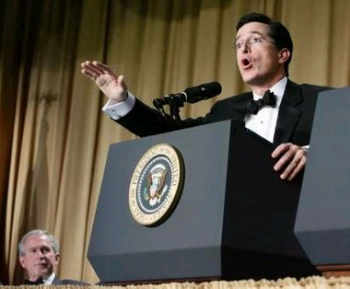
A brief survey of comedic political caricatures on television over the last four decades suggests three primary forms. Perhaps earliest and surely the most politically impotent, if not out-right flattering, are impersonators such as Rich Little and Vaughn Meader (The First Family). Typically appearing on late-night talk shows such as The Tonight Show or on any number of variety programs, the gist of the political performance is impersonation—to look or sound as much like the president as possible. It is a mimetic performance, and ultimately the interest for audiences resides less in any latent form of political critique, but more in the simple pleasure of resemblance.
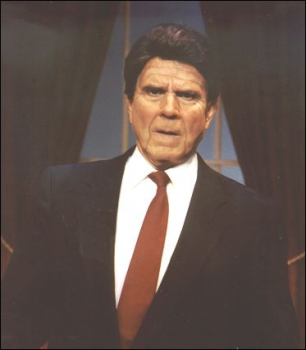
In American television history, Saturday Night Live has perhaps had the biggest impact in shaping the second form, the sketch comedy approach to presidential caricature. With comedians such as the moppy-haired Chevy Chase portraying Gerald Ford or the tall and lanky Will Ferrell pretending to be George W. Bush, the comedian isn’t attempting to look or necessarily sound like the president. Rather, the comedian creates humorous situations that we, the audience, then read onto the president. Like an editorial cartoon, certain features are exaggerated for comedic effect. Hence, Chase makes Ford into a clumsy and bumbling figure. Dan Aykroyd focuses on Nixon’s paranoia or Jimmy Carter’s sincere Sunday School teacher demeanor.
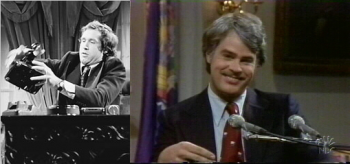
Phil Hartman plays-up Clinton as a voracious consumer (of women and French fries). And Will Farrell captures Bush’s problems with the English language (“strategery”). Although some SNL comedians did shoot for physical and phonetic resemblance (Dana Carvey as George H. W. Bush and Darryl Hammond as Al Gore), the comedic pleasure is typically more diegetic—envisioning the president articulate these comedic narratives. Therefore, we see Jimmy Carter using his intelligence to talk a caller down from a bad acid trip; a robotic and patronizing Al Gore referring to “lock box” like a stuck phonograph; a intellectually challenged yet arrogant George W. Bush making it all up as he goes along.
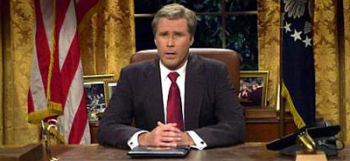
More recently, a third form of presidential caricature on television has appeared in the form of the situation comedy genre. In 2001, Comedy Central took the bold move (and the first of its kind) to devote an entire series to making fun of a sitting president. From South Park writers and producers Trey Parker and Matt Stone, the series, That’s My Bush!, was a satirical take on the First Family. The primary intent of the show, Parker and Stone repeatedly argued in the press, was less to satirize Bush or the presidency and more to parody the obnoxiousness of the sitcom itself. And indeed, the show did skewer the inane suburban home and office situation comedies, including a cast that featured the wise-mouthed maid, the next door neighbor who is always dropping by and making himself at home, and the sexy but dumb secretary who is accompanied by laugh track hoots and whistles when she enters the room (a la Married…With Children).
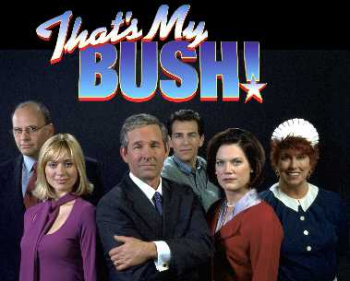
Nonetheless, the portrayal of Bush as an affable, yet nonetheless moronic and somewhat lazy president doesn’t allow for Parker and Stone’s defense that their show wasn’t political. For instance, the president’s right-hand man is none other than “Karl Rove.” In one episode, the president personally executes a death row inmate by pouring drain cleaner down his throat, only after reading him his last rights: “You have the right to die like a little bitch, have your soul sent to hell” (even though Bush thinks he is faking an execution to impress his old frat brothers). In another episode, Bush outlaws guns after being told by a psychic that someone has it in for him. But the episode that perhaps signals just how far television has come in its satirical treatment of a sitting president and his family is one in which Laura Bush tries to figure out why George no longer seems interested in performing oral sex on her. The communication problems ensue when she thinks that the “old and smelly” cat that George is referring to isn’t the 24-year old family pet, but her own feminine hygiene problems. That’s my bush, indeed!
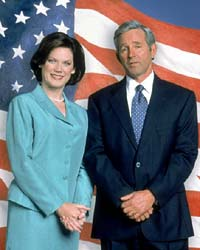
When the program appeared on Comedy Central, television critics were less enamored of it than audiences (the program actually brought in fairly strong ratings for the network, but was cancelled after eight episodes because it was the most expensive program the network produced). But one critic from the Buffalo News expressed his shock and dismay at the cultural zeitgeist when he wrote, “No president—not even George W. Bush—deserves the putrid adolescent japery of what I’ve seen on ‘That’s My Bush!’….If this isn’t truly disgusting and reprehensible television, I don’t know what is.”[1] Little did this writer know, things were about to get even worse a few years down the line.
In 2007, Comedy Central again returned to the Bush presidency, this time airing the animated situation comedy Lil’ Bush. George W. Bush is portrayed as a stupid and hubristic First Child (because Daddy Bush is still in the White House) running around with his pals Lil’ Cheney, Lil’ Condi, and Lil’Rummy, engaging with various enemies such as Lil’ Kim Jong Il and Lil’ Al Gore.
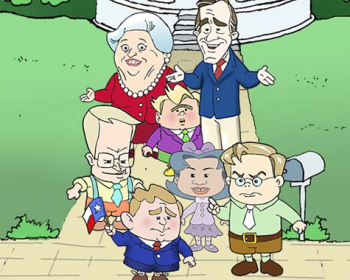
The show’s creator, Donick Cary (a former Letterman and Simpsons writer) described the show as “The Little Rascals with nuclear weapons.” The portrayal of Bush and his diabolical pals (Lil’ Cheney is seen biting the heads off chickens) isn’t just critical—it’s downright brutal. Bush administration policies are always front and center. In one episode, Lil’ George is slated to make a class presentation on how a light bulb works. George says, “Sorry, Teachy, need more time. The science on this complicated issue is still out. But don’t worry. I’m forming a panel that will deliver a report on this issue in the next five years.” In another episode, Bush’s summer camp gang takes on Camp Al-Qaeda, and near the end, the gang must perform a song at a talent show. Lil’ Condi is frustrated, and announces, “I’m worried about the show tonight. We spent so much time pranking those hairy terrorists that we don’t have a song for the talent show.” Bush replies, “You’re right, Con. There’s only one thing left to do.” Lil’ Condi naively asks, “Spend the next few hours writing a really great song?,” to which Lil’ George replies, “No, no. Design such an awesome stage show that no one will notice how bad our song is. It’s a policy I call ‘Rock and Awe.’” After the band performs dressed as Kiss, the episode ends with words flashed on the screen, “Lil’ George never stopped rockin’…until 1986, when, for political reasons, he was born again. His prank war against the terrorists continues to this day.”
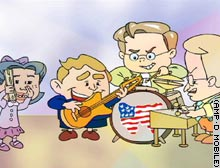
Cary defends the critique by arguing that it is an honest one. And sometimes that portrayal isn’t too far from the truth. In the episode “Nuked,” Lil’ George complains, “I hate doing what I’m told. I want to be a decider!,” whereas real-life President Bush recently proclaimed, “My job is to make decisions. I’m a decision—if the job description were, what do you do, it’s Decision Maker. And I make a lot of big ones and I make a lot of little ones.”[3] Each episode also features the Lil’ Bush Band performing as a punk-rock group and singing tunes that illustrate the episode (with lyrics written by Cary). In “Nuked,” for instance, the song “Decider” accompanies images of Bush launching nuclear strikes on Kim Jong Il, Hillary Clinton, Barak Obama, Nancy Pelosi, gay couples, anti-war activists, and blue states. The song’s lyrics include “I’m the Decider making up my mind, blowin’ up things, I’m feeling fine. Decide, decide, listen to my gut, going nu-cle-ar, I’m going all nuts….Bringing death from above with no remorse, if you complain, I’ll just stay the course” with the refrain, “De-cid-er-er, De-cid-er-er.” The connection to punk rock, Cary notes in an interview, is an intentional commentary on the Bush administration’s style of conduct: “Dive in headfirst. Break stuff up. Don’t care what people think. It’s VERY punk-rock.”[4] And indeed, punk rocker Iggy Pop does the voice of Lil’ Rummy just to keep it honest!
The reaction to the show in the press was even more aggressive and negative than the reviews which accompanied That’s My Bush!’s debut. Most complained that the show was not funny and that the critique was not timely (appearing after the 2006 electoral setbacks for the Republican Party).[5] Others complained that nothing in the episodes amounted to real satire or contributed significant insights.[6] But such commentary is missing the (punk-rock) point. Punk has never tried to provide cutting edge musical innovations or offer cerebral insights on the need for social and political change. Punk is reductive and simplistic. It is aggressive and loud. It takes no prisoners and ultimately doesn’t give a fuck if you like it or not. The punk point of Lil’Bush is not to mimic the conventions of television humor (that is, the expectation to be funny or satirically insightful). Instead it is to mimic and mock the style, attitude, and conventions of the president and his administration itself, yet warped just enough to get your attention and perhaps offend in the process.
That’s My Bush! and Lil’ Bush bookend the Bush presidency. The caricature moves from Bush as father to Bush as small child. His stupidity is no longer harmless, but instead quite dangerous. He is no longer affable and loveable, but rather, mean-spirited and evil. Bush’s consorts are part of the picture as well—from neighborly and sexy to vicious and wicked (in one episode, Lil’ Rummy draws a picture of a bunny rabbit with a knife in his belly and says, “That will teach you to hop in the woods without body armor”). Certainly featuring a president with abysmal approval ratings “allows” for such brutal critiques. But these bookend series also suggest that the president, his family, and his advisors are fair game for almost any portrayal (at least on cable television!). And although programs like Saturday Night Live will most certainly continue to offer mainstream versions of political caricature, Comedy Central has forever altered the landscape of acceptability in television’s satirical critiques of sitting presidents. Turning back the clock, as the writer for the Buffalo News seemingly desired, simply isn’t possible at this juncture. Punk rock is here to stay!
Notes:
[1]“Trashy ‘That’s My Bush’ Cheapens Real Political Satire,” Buffalo News (New York), 10 June, 2001. Retrieved from Lexisnexis.com, August 6, 2007.
[2] Moore, Frazier. “Heckuva Job: Comedy Central’s New Satire, ‘Lil’ Bush, Takes a Cartoon Look at the President,” Associated Press, 11 June 2007. Retrieved from Lexisnexis.com, July 15, 2007.
[3] Ibid.
[4] Ibid.
[5]
Mike Hale, “The President and His Friends, Younger and More Animated,” New York Times, 13 June 2007: E10.
[6]
For instance, Newsday critic Diane Werts, who argues that the show is “mostly just outrageous, designed to offend as much as to make any salient point….Yet little of it adds up to much of anything but foul-mouthed mischief.” “Not Bush League, But It’s a ‘Lil’ Close,” Newsday (New York), 13 June 2007, B21.
Image Credits:
1. Lil’ Bush
3. Rich Little as Pres. Reagan
4. (a)Chevy Chase as Pres. Ford (b)Dan Aykroyd as Pres. Carter
7. Laura and George in That’s My Bush!
8. The animated cast of Lil’ Bush
Please feel free to comment.
Thanks for another provocative and timely column, Jeff. I especially like the different historical forms of presidential caricature that you introduce. Your piece reminded me of the short-lived TV series in the late 80s, D.C. Follies, where the comedic actor Fred Willard interacted with puppets based on celebrities and inside-the-beltway politicos at his bar in DC. I’m wondering where you might locate the presidential puppets of D.C. Follies on your emergent schema? Would it be a new category, a combination of two, something else entirely? From what I can remember, the show’s depictions of its former presidents, in particular, were extremely cartoonish, not especially mean-spirited, and hardly critical of the sit-com form (again, from what little I can remember). Surprisingly (and sadly), YouTube only has a few clips from the show. For those who’d like a reminder, here’s a clip.
Wow! That clip of DC Follies is so bad it kind of takes my breath away. Guess I’ve been watching too much Sesame Street these days with my son (which can be quite clever). But this is both unfunny and uncritical. I think Sid and Marty Krofft’s H.R. Pufnstuf might have been more subversive (if you give Witchiepoo a Guantanamo reading)! Frankly, I don’t know what to say other than, what network ran that show? Seriously, you’ve stumped me on this one–I’ll have to give it some thought.
What strikes me as interesting here is that prior to the W. Bush administration, I do not recall members of the president’s “entourage” also being main characters for satires. Is this true or is my memory of political satire simply weak?
The satires on the W. Bush presidency show a shift in popular American thinking: a presidency is being viewed as a group of people not one leader. They are not mere targets; the whole administration is viewed as influential and worthy of public critiques. Is this because the president is viewed as stupid and in need of advisors, or is is because we have shifted our thinking from “king-leader” to “influential group”?
In addition, since Lil’ Bush is a cartoon, kids and teens watch it. I know, I know, it is not intended for the youth, but that’s how it goes. I worked with middle school youth who would watch Lil’Bush because it reminded them of South Park. The next day, they would ask me “who is Rummy anyhow?” Seldom do I get asked to talk about political players with youth, so this was welcome, despite the possible crude nature of the cartoon.
The equation of the W. Bush regime to punk-rock strikes me as disturbingly accurate. If we take punk, following from Dick Hebdige’s (1979)account, to be an expression of white, blue-collar ethnicity, then we can certainly see the markings of W’s early popular appeal, with his image being as carefully predicated on “dissembling” as that of the punks. Further, his regime does seem to be characterized by “the refusal to speak and be positioned…. solipsism, neurosis and cosmetic rage” (28) associated with punk; simply consider the reliance Colbert shares with the President on his “gut.” But W’s position of power makes any claim of resistance somewhat problematic: whose will is he resisting? Against what is he rebelling?
It would seem that W. Bush is decidedly post-punk. That is to say, W’s punk is not “steeped in irony” or parody (63), nor does it adopt the values of “‘anarchy,’ ‘surrender’ and ‘decline'” (64). His punk has already been chewed and digested by the mainstream, its salience reduced to a commodified form. Bush is selling resistance/rebellion to an audience that thinks such values are inherently “cool.” That in itself may comprise a whole other problem.
One final thought, the choice to read “Lil’ Bush” as satire is an interesting one. One might also read it as parody, noting the possibility for parodies to be read as flattering to the original text. This seems to be the mode in which conservatives read Colbert (at least, prior to his keynote address), and that thought is enough to wake me in the night after watching an episode of “Lil’ Bush.”
I think now more than ever we need show like this. We need someone to come along and satirize what’s going on. Sometimes when you read things in the newspapers they aren’t always clear. When I watch these shows they kind of make things more clear to me. You need a punk rock state of mind these days because regular people are afraid to speak their minds. It’s up to the punks to step up and say something.